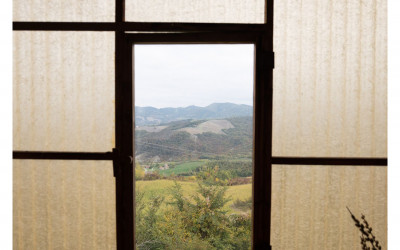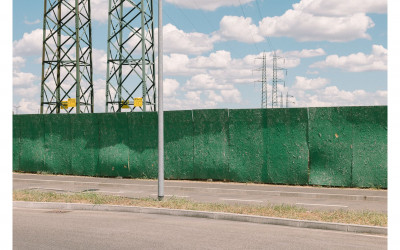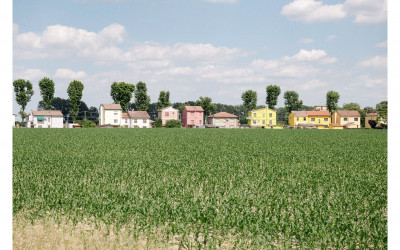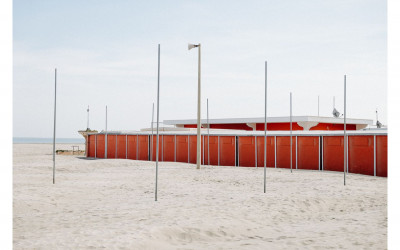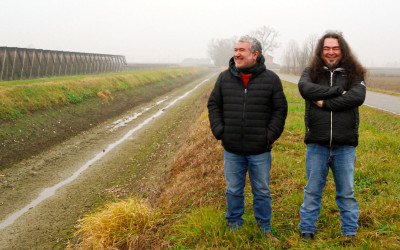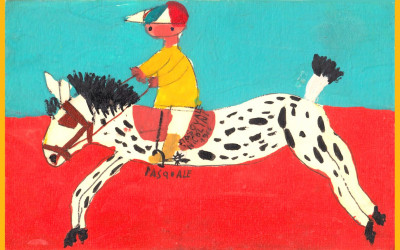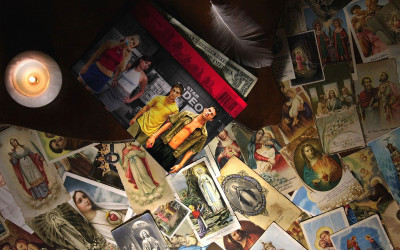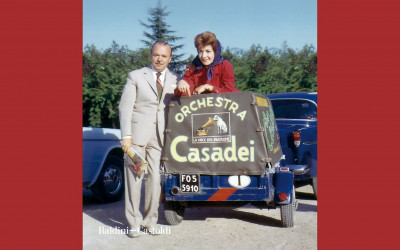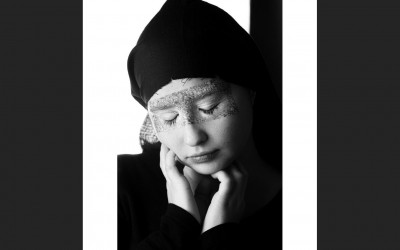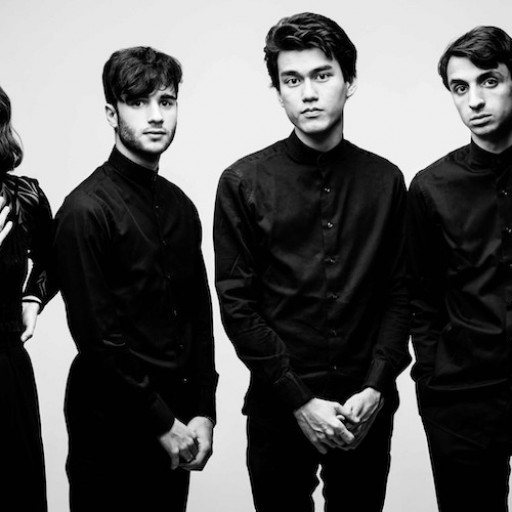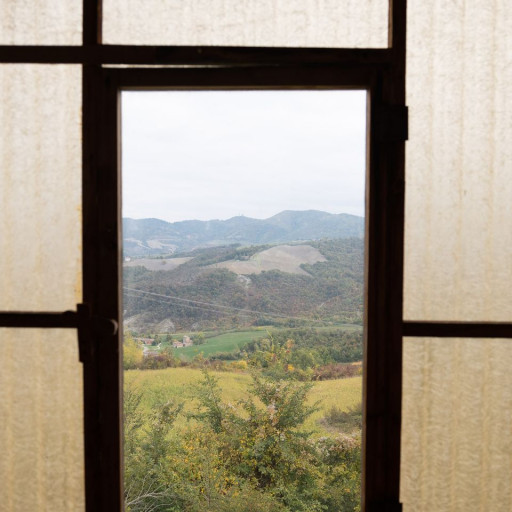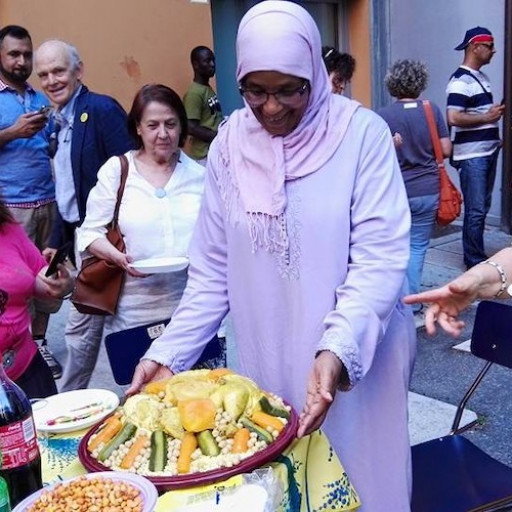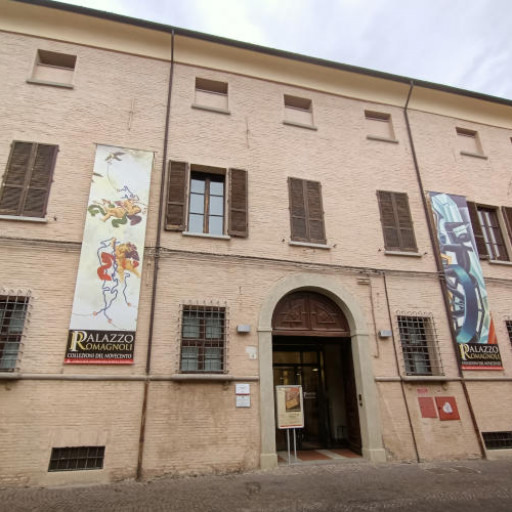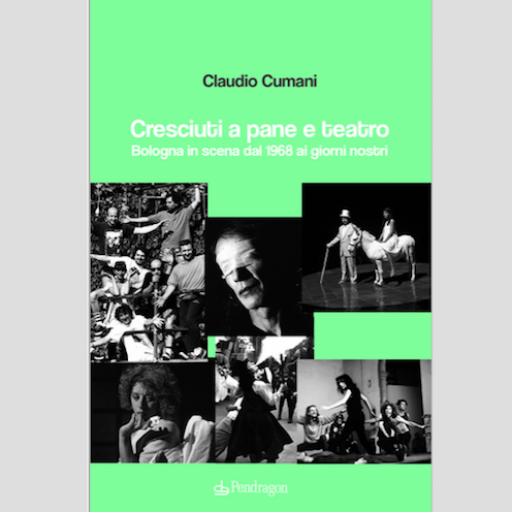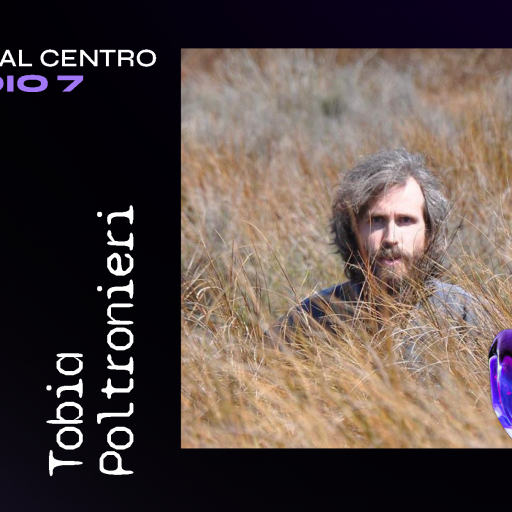Nato a Parma, ma da anni cittadino britannico, Max Mazzoli insegna italiano e inglese a Cambridge. Nel 2014 ha raccolto in volume le poesie scritte nel ventennio precedente.
da Città / Cities
PARMA
Parma, oggi dormi assopita nella nebbia,
dimenticata e soave nella pianura,
persa nell’inverno livido e tumefatto,
sempre a te stessa uguale, oltre gli screzî del tempo.
Irriverente e altezzosa, secondaria e importante,
seducente provinciale.
Si passeggia per le strade nelle vie del centro
in cerca di una pasticceria
con un occhio ai libri e alle vetrine di moda
e l’altro alle ragazze e a quel che indossano.
Vestire è qui un modo di appartenere,
l’abito un’uniforme.
I tuoi bar pullulano di vecchi e di giovani,
generazioni si incontrano e si scontrano
intercalando parole indigene, esoteriche espressioni
sconosciute ed incomprensibili a chi viene da fuori.
Parma, marginale ed eterna,
terra dei miei padri. Terra madre.
Parma, mia città, ti amo e ti detesto;
mi vergogno un po’ di te
come un immaturo adolescente.
Illusa provinciale, quando mai crescerai?
Quando mai cresceremo tu ed io?
Ti lasciai per abbracciare il mondo
e quando torno da te so che mi appartieni,
ma sento che io non t’appartengo piú.
O forse è proprio il contrario:
io t’appartengo, ma tu non piú a me.
È difficile tornare ad essere quelli che eravamo,
negli inverni nebbiosi del passato,
quando cercavamo un amore che compensasse
il freddo e il vuoto di un’anima irrequieta.
Nei tetti, nei muri, nei cortili
e in ogni mattone imbrunito dal tempo
c’è una parte di me che riconosco.
Con te mi sveglio e con te mi addormento.
La mia tristezza è la tristezza del tuo inverno
adagiato sull’inesorabile pianura;
la mia gioia è la tua gioia delle verdi colline
dove a sud della città inizia l’Appennino,
insieme ai ricordi di ogni estate,
dove aldilà di quei rilievi
si distende la terra dei poeti.
Parma, mia incurabile malattia,
amore e nostalgia dell’infanzia
che passò cosí lenta ed impregnante;
e che ora, mentre piú s’allontana, piú s’avvicina.
Parma, la tua vita scorre tra le volte della Pilotta
e il brulichio del mercato in Piazza della Ghiaia.
Piazza Duomo è un’oasi nel tempo
e San Giovanni come un angelo custode
veglia sull’assorto battistero.
Si commenta, si applaude e si fischia,
per il terrore del tenore di turno in balía
degli esperti e dei saputoni della prima,
sparsi fra loggione palchi e platea.
Parma, via dell’Università, via del Conservatorio:
gli studi e la musica, e gli studenti che ravvivano
la città percorrendo a piedi o sugli autobus
il Ponte di Mezzo sul torrente in piena,
e attendono con ansia la tarda primavera
per invadere il Parco Ducale o la Cittadella,
travolti da nuovi amori.
Arriverà l’estate, l’afa e il caldo soffocante
quando nella canícola il giallo Parma
delle facciate dei palazzi
diventa un oro lucente ed inebriante
che ancora riecheggia nei miei pensieri.
Ogni volta che torno cerco di misurare
i tuoi inevitabili cambiamenti,
ma in fondo sei sempre la stessa.
PARMA
Parma, today you are calmly asleep in the mist,
Forgotten and gentle on the plain,
Lost in the bruised swollen winter,
Always equal to yourself, beyond the frictions of time.
Irreverent and haughty, secondary and important,
Seducing provincial town.
One strolls about town and in the streets
Looking for a patisserie,
Glancing at books or window-shopping for fashions
And staring at girls, checking what they wear.
Here your attire is a way of belonging,
Your clothes are your uniform.
Coffee shops are teeming with old and young,
Generations meeting and clashing
Exchanging indigenous words, esoteric expressions,
Unknown, unintelligible for the newcomer.
Parma, marginal and eternal,
Land of my fathers. Motherland.
Parma, my city, I love you and I loathe you;
I’m a bit ashamed of you
Like an immature adolescent.
Deluded provincial, when will you ever grow up?
When will we ever grow, you and I?
I left you because I wanted to embrace the world,
And every time I’m back, I know you belong to me,
But I feel you’ve lost me,
Or maybe it’s just the other way round –
I’m still yours, but you’re not mine any longer.
It’s difficult when I’m here again, and we try to be what we were,
During those foggy winter days of the past,
When we would look for some love that could make up
For the cold and the void of a restless soul.
On the roofs, on the walls, in the yards,
And in each single brick darkened by time
There is a part of me that I can recognise.
With you I wake up and with you I fall asleep.
My sadness is the sadness of your winter
Lying on your inexorable plain;
My joy is the joy of your green hills
Where south of the city the Apennines rise,
Along with the memories of every summer,
Where beyond those mountains
The poets’ land lies.
Parma, my incurable disease,
Love and nostalgia of my childhood,
That went by so slowly and was so affecting;
And that now, while fading away, gets closer and closer.
Parma, your life flows under the Pilotta’s arches
And the swarming in the Ghiaia Square’s market,
Piazza Duomo is an oasis in time
And St. John’s, like a guardian angel,
Wakes over the pensive baptistery.
Everyone comments, applauds or boos,
For the detriment of the scared tenor in charge,
At the mercy of the experts, and know-it-alls,
Scattered around the stalls or on the balcony
On the debut night.
Parma, via dell’Università, via del Conservatorio –
The studies and the music, and the students brightening up
The city, all around on foot or on buses,
Crossing the Central Bridge above the river in spate,
And looking forward to the late Spring
To flock to the Duchess’s Park or the Citadel,
Overwhelmed by new love.
Summer will come, stifling hours and sultry days,
When in the heat wave the yellow
Of the buildings’ façades
Becomes inebriating, shimmering gold
That still echoes in my thoughts.
Every time I come back, I try to gauge
Your inevitable changes,
But after all, you’re always the same.
LONDRA
Londra, di parchi cosparsa in eterno,
E di nostalgie, di idiomi e di accenti;
Converge in te il mio universo,
Porta a te la mia storia.
Città elettiva, dove rinacqui,
Dove la primavera ritorna e risorge.
Porti e quartieri, strade e giardini
Di una mia estesa adolescenza,
Solitudine e amore, Londra, ombelico del mondo.
Westbourne Terrace e Queensway avete contato i miei passi,
Londra, hai perpetuato la mia vita,
Continuato il mio nome.
Londra, sirena incantatrice, giunonica imperatrice,
Altezzosa signora, esile modella,
Umile maestra di solidarietà, insieme di villaggi,
Timorosa e avvenente.
A luglio l’erba di Hyde Park era un tappeto invitante
Su cui sdraiarsi e guardare il cielo, per la prima volta,
La prima volta nel mondo.
Mi accogliesti, madre adottiva, come un figlio sperduto.
Quante patrie in un solo luogo, quanti templi,
Quante città in una sola strada.
Quanti amori in una sola stanza,
Quante solitudini tra cosí tanta folla,
Quanta disperazione in una sola sera.
Era immersa in noi la tua essenza.
Infine non feci che prenderti per mano, e tu la mia,
E mi accompagnasti tra i secoli e tra le genti,
Nelle geografie e nelle storie, in altri mari,
In altre città lontane e sconosciute,
Tra arcipelaghi inesplorati.
Quanta vita. Quante vite.
Ho dimenticato gli inganni, non importano piú.
E noi poveri, ultimi della fila, ultimi della classe,
A condividere bagno e cucina,
Solo una stanza e nemmeno il posto per farti sedere e parlare.
Solo un letto e un armadio e nemmeno piú spazio per respirare.
Il quattro di luglio – il compleanno di mia madre.
Un treno lungo come la vita,
E una valigia nella notte, una notte di mille anni fa.
L’otto di marzo – il compleanno di mio padre.
Un’altra notte ancora, a sfidare l’inverno,
Provare a dormire su di una panchina di Bayswater Road,
Unico rifugio per i diseredati, i senza terra e senza lingua.
Compleanni – coincidenze di una rinascita.
Londra, da te si misura il tempo, e da te inizia il mondo,
Dalla linea tracciata sulla collina di Greenwich.
Fosse il vento o la pioggia o il timido sole di aprile,
O le grigie nubi che sovrastano la metropoli,
Mi ricordavi l’infanzia.
Mi ritrovai, anni piú tardi, perso in Caledonian Road,
Su quel primo autoubus, un double-decker che portava il 14.
E poi Paddington aveva un sapore amaro a volte
E un’aria oscura – vederti partire e tornare,
Tra la moltitudine, e tutto il plumbeo umore
Del capriccioso cielo inglese.
E la pioggia amica, veloce e distratta,
Che va e che viene come i passeri di passaggio
Nel giardino o sul davanzale della finestra.
Ma a Kensington Gardens l’estate era un universo di suoni e di colori.
Le ragazze dai jeans sgualciti ostentavano bellezza e gioventú,
La fragranza degli anni precoci
Nelle spalle scoperte e nei fianchi preziosi.
E poi indietro, ancora prima,
Prima dei caffè, prima dei roller blades,
I fattorini di cucina e i portavaligie cosí indaffarati
Al London Elizabeth Hotel, davanti a Lancaster Gate,
(Dove vidi uscire James Bond su una berlina Rover,
Dove nel 1984 vidi sfilare il lugubre corteo per la morte di Indira Ghandi;
L’anno di George Orwell, che mi ricordava la Senate House di UCL
Come il quartier generale di New Speak, nel suo torreggiare autoritario,
E le ossa e la faccia di cera di Jeremy Bentham,
Che passavo ogni mattina per andare a lezione,
Fosse Dante o Chomsky) sotto al Royal Lancaster Hotel,
A due passi dagli Italian Gardens e le fontane,
E all’ombra di Peter Pan.
Eravamo noi gli esuli del mondo,
I rifugiati, gli immigranti, gli esiliati.
Eravamo noi i saltimbanchi, i giocolieri,
Gli artisti della strada, i musici ambulanti,
Eravamo noi i mendicanti, e i ladri,
Gli studenti, e gli illusi sognatori.
Eravamo noi i camerieri alle colazioni negli hotel,
I ricezionisti, i portieri di notte,
I commessi dei negozi del centro.
Eravamo noi in fila ad attendere alle lavanderie pubbliche,
O davanti alle cabine telefoniche.
Eravamo noi ad accordare le chitarre, a cercare le ragazze,
Ad accarezzare arpeggi, ad inseguire amori impossibili.
Ad imparare parole brasiliane e castigliane.
E ti ricordi le mie mani sul pianoforte bianco del Jarvis,
Inseguire gli accordi dei Beatles,
Dopo aver servito le colazioni, e sbarazzato tutti i tavoli?
Forse? Forse nessuno di noi è rimasto.
O forse ci portiamo un piccolo residuo di quello che fu,
Incastonato nei nostri reconditi pensieri,
In qualche altra parte del mondo.
Immagina, toccare con gli occhi la Stele di Rosetta,
Ora cosí vicina, ora cosí reale, tra Holborn e Bloomsbury Square.
Il caffè di Soho, le prime del West End,
Dove Buddy Holly ha continuato a suonare per anni
Anche dopo la sua morte, cosí distante, cosí beffarda,
In una bufera d’inverno.
Le librerie e le chitarre usate di Charing Cross Road.
Il tremolio del letto nella stanza del seminterrato,
Quando passava la metropolitana della Central Line,
E le grida amiche dei gabbiani al mattino
Che s’incontravano con i miei sogni all’imminente risveglio,
Sogni confusi con le voci di Shakespeare
Echeggianti dal Globe Theatre a ridosso del fiume.
Flat 5, 29 Leinster Square, London W2, fu la mia prima vera casa,
Tra Spagna ed Australia, Portogallo e Nuova Zelanda.
Flat 3, 3 Queesborough Terrace, di nuovo solo,
Il costo dell’indipendenza,
Senza i soldi per il riscaldamento,
Dove il piú freddo novembre che possa ricordare,
Entrava da un insidioso buco nella finestra.
Poi finalmente la pace e l’amore,
75a Hammersmith Grove, fu la mia prima famiglia
e Lucas e Stefan nel giardino sotto il melo.
Londra delle canzoni, Londra delle lingue,
Londra degli incontri, Londra delle nuove frasi,
Scritte e parlate, recitate o piante, o sorrise, o condivise.
Londra, umile sorella, madre generosa,
Dove nacquero i miei figli, e le parole che mi inseguono,
Accogli questa mia ultima preghiera,
Forse un’altra, forse sempre la stessa.
Forse l’unica per te.
LONDON
London, with parks eternally strewn,
And with home memories, with idioms and accents;
My universe converges on you,
My history leads to you.
Elective city, where I was born again,
Where Spring returns and rises again.
Harbours and boroughs, streets and gardens
Of my extended adolescence,
Loneliness and love, London, the world’s navel.
Westbourne Terrace and Queensway have counted my steps,
London, you have perpetuated my life,
Carried on my name.
London, mesmerising mermaid, Junoesque empress,
Haughty lady, slender model,
Unassuming teacher of solidarity, collection of villages,
Timorous and attractive.
In July Hyde Park’s grass was an inviting carpet
On which to lie down and look at the sky, for the first time,
The first time in the world.
You welcomed me, adoptive mother, as a stray son.
So many homelands in just one place, how many temples,
So many cities on just one road,
So many loves in just one room,
So much solitude in such a multitude.
So much despair in just one evening.
Your essence was deep within us.
In the end I only had to take your hand, and you took mine,
And you led me through the centuries and the people,
In the geographies and the histories, on other seas,
In other faraway, unknown cities,
Amid unexplored archipelagos.
So much life. How many lives.
I’ve forgotten the deceptions, they don’t matter anymore.
And we poor, the last ones in the queue, the last ones in the class,
Sharing bathroom and kitchen,
Only a room and not even a place to sit down and talk.
Only a bed and a wardrobe and not even space to breathe.
The 4th of July – my mother’s birthday.
And a train as long as your life,
And a suitcase in the night, a night a thousand years ago.
The 8th of March – my father’s birthday.
Still another night, to defy the winter,
Trying to sleep on a bench in Bayswater Road,
The only refuge for the destitute, the landless, those without a language.
Birthdays – coincidences of a rebirth.
London, from you time is measured, and from you the world begins,
From the line drawn on Greenwich Hill.
Whether it was the wind or the rain or the timid April sun,
Or the grey clouds hanging over the metropolis,
You would remind me of my childhood.
I did find myself – years later – lost on Caledonian Road,
On that first bus, a double-decker carrying the number 14.
And then Paddington had sometimes a bitter taste,
And a sombre look – seeing you leaving and returning,
Among the crowd, and all the leaden mood
Of the whimsical English sky.
And the rain, friendly, swift and distracted,
That comes and goes like sparrows passing by,
In the garden or on the window ledge.
But in Kensington Gardens the summer was a universe of sounds and colours.
The girls in worn-out jeans would show off their beauty and their youth.
The fragrance of their early years
In their bare shoulders and their precious waists.
And then before that, even earlier,
Before the coffee shops, before the roller blades,
There you had the kitchen porters and the valets, so busy,
At the London Elizabeth Hotel, opposite Lancaster Gate,
(Where I once saw James Bond driving off in a Rover saloon,
Where in 1984 I saw the funeral cortege march for Indira Gandhi’s death;
George Orwell’s year, reminding me of the Senate House of UCL
As the headquarters of New Speak, in its authoritarian towering,
And the bones and waxy face of Jeremy Bentham,
Whom I passed every morning on my way to lessons,
Whether it was Dante or Chomsky) below the Royal Lancaster Hotel,
At a stone’s throw from the Italian Gardens and the fountains,
And in the shade of Peter Pan.
It was us, we were the expats of the world,
The refugees, the immigrants, the exiles,
It was us, we were the acrobats, the jugglers,
The street artists, the buskers.
It was us, the beggars, the thieves,
The students, and the deluded dreamers.
It was us, the breakfast waiters and waitresses in the hotels,
The receptionists, the night porters,
The shop assistants in the town centre.
It was us, waiting in a queue at the public laundrettes,
Or in front of a phone box.
It was us, tuning our guitars, longing for girls,
Caressing arpeggios, chasing impossible loves,
Learning Brazilian and Castilian words.
And do you remember my hands on the white piano at the Jarvis,
Tracking the Beatles’ chords,
After having served the breakfasts, and cleared up all the tables?
Maybe? Maybe none of us is still around.
Or perhaps we carry inside a little residue of what it was,
Inlaid in our secluded thoughts,
In some other part of the world.
Imagine, touching with your eyes the Rosetta Stone,
Now so near, now so real, between Holborn and Bloomsbury Square.
Soho coffee, the debut nights in the West End,
Where Buddy Holly has kept playing for years,
Even after his own death, so faraway, so ironically mocking,
During a winter storm.
The bookshops and the second hand guitars in Charing Cross Road.
The trembling of the bed in the basement room,
When the Central line train went by,
And the friendly seagull cries in the morning
That would cross my dreams just before awakening,
Dreams confused with Shakespeare’s voices
Echoing from the Globe Theatre next to the river.
Flat 5, 29 Leinster Square, London W2, that was my first real home,
Between Spain and Australia, between Portugal and New Zealand.
Flat 3, 3 Queensborough Terrace, alone once again,
The price of independence,
Without the money for the heating,
Where the coldest November I can remember
Would enter from an insidious hole in the window.
Then, finally, peace and love,
75a Hammersmith Grove, it was my first family,
and Lucas and Stefan in the garden under the apple tree.
London and songs, London and languages,
London and encounters, London and phrases,
Written and spoken, recited or wept, or smiled upon, or shared.
London, humble sister, generous mother,
Where my children were born, as well as the words that are pursuing me,
Accept this last prayer of mine,
Perhaps another one, perhaps always the same one,
Perhaps the only one for you.
——————————————————-
da Insoddisfatta Sete / Unquenched Thirst
I poeti sono patetici,
scrivono frasi pretenziose
di poco senso e di poco valore, che nessuno capisce;
sono illusi e disillusi,
introversi, indulgenti verso le proprie passioni.
Parlano in prima persona, poi dicono tu, io, lei,
o forse sono solo bambini
che non hanno ancora imparato
ad abbandonare il mondo,
a lasciarlo scorrere per il suo verso,
a lasciarlo cadere.
È difficile perfino calpestare il suolo
e innaffiare piante, o cogliere frutti,
o bere ad una fontana.
O forse è come collezionare francobolli o monete,
accumulare emozioni attraverso stracciate parole.
… Ecco che ancora ritorna
quel laborioso rigetto dei primi scritti,
quel filo di seta che il ragno acrobata
ha tessuto tra i rami del giardino di casa,
non lontano dall’intricato intrecciarsi del nido delle tortore,
architetture e strutture istintive che accompagnano
questi pensieri di china.
Poets are pathetic,
They write pretentious sentences
With little sense, of no value, that nobody understands;
They are deluded and disillusioned,
Introverted and self-indulgent.
They speak in first person, then they say you, I, her,
Or perhaps they are just
Children that have not yet learnt
To let the world go,
To let it run its own way,
To let it drop.
It is difficult even treading on the ground
Or watering plants, or picking fruit,
Or drinking from a fountain.
Or maybe it’s all like collecting stamps or coins,
Accumulating emotions through ragged words.
… Here it is, coming back,
That laborious rejecting of the early writing,
That silk thread that the acrobatic spider has woven
Between the branches in our home garden,
Not far from the intricate intertwining of the turtledoves’ nest,
Instinctive architectural structures accompanying
These thoughts made of ink.

